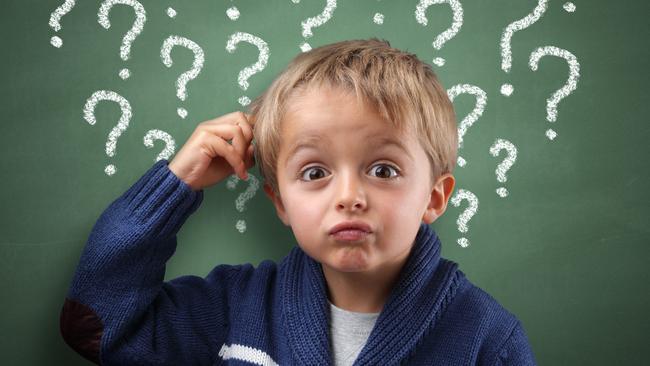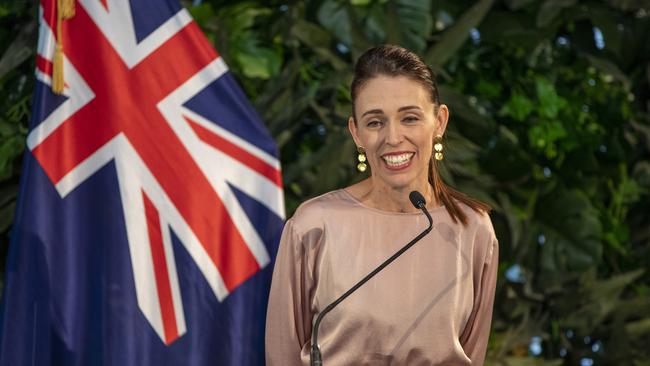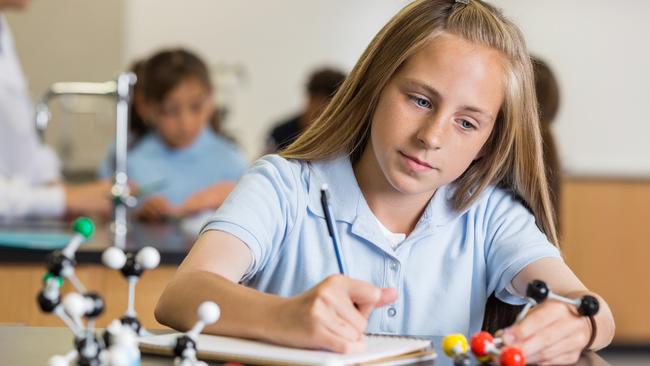Peta Credlin: For the sake of our future, give our kids a proper education
Labor’s climate policies coupled with a failing education system does not bode well, Peta Credlin warns. If our children are going to steer us through one of our most challenging periods, they need higher quality teaching.
Rendezview
Don't miss out on the headlines from Rendezview. Followed categories will be added to My News.
Two issues collided for me this week — the folly of making massive uncosted commitments, in this case Labor’s latest target for zero-net emissions by 2050, and a couple of new reports that show just how substandard our education system has become.
The collision is important because in 30 years’ time — 2050 — the students in school today will be running the show and the good education they’re not getting now will be needed more than ever as our country faces one of its most challenging periods in history.
As Business Council of Australia said last week, make no mistake, going to zero-net emissions by 2050 will be transformational to the Australian economy.
Well that’s an understatement. By their own calculations, the BCA says it will require a $22 billion-a-year investment in carbon neutral technologies. Given that’s about two-thirds what we now spend on defence, or well over 1 per cent of GDP, it’s a massive new call on Australia’s budget which will be far weaker than it is today.
Everyone must understand Australia’s economic reality if we really do adopt zero-net emissions; we will no longer be a resource powerhouse with coal and gas banned for use here as well as export, agriculture — gone — due to the methane emissions and airline travel prohibited too, again due to emissions.

For us at least, at the bottom of the world, it will be the return of the old days of isolation, the Tyranny of Distance, only this time by choice.
Anthony Albanese said on Friday he wished a zero-net emissions commitment was as “uncontroversial” here as it was in other parts of the world. Not so. It’s pretty controversial in France with the yellow vest movement.
And elsewhere, as with everything, the devil is in the detail when it comes to global promises on climate. Take New Zealand as an example; Jacinda Ardern is promising zero-net emissions by 2050 but only because she’s exempting the biggest source of NZ emissions and that’s agriculture.
There’s also a government-own report that says meeting this new 2050 target will require spending, each and every year, equivalent to NZ’s entire yearly budget. So where’s the money coming from? Doesn’t matter does it? Arden will be long gone. As will Albanese, Macron and Boris too.
What so-called leader is it, that announces a policy commitment for 10 elections time, and is proud of the fact he has no idea what it will cost?
For all the business leaders, too, calling for an uncosted 2050 target, when did you last get board approval for any idea absent a business plan and pages of spreadsheet calculations? Why are voters being treated with such contempt at a time when we need leadership more than ever?
It’s a different circumstance I know but I keep feeling we’re being led by appeasement Chamberlains on this climate stuff when we really need Churchills. But here we are.
Which is why the parlous state of our education system should concern us all given the students of today will have to fix this looming mess, and they’ll be more economically constrained than ever before, notwithstanding the atmospheric reality that anything Australia does, in the words of the Chief Scientist, means ‘ ‘virtually nothing’’ in terms of global temperature change.

A new NSW Parliamentary report found last week our schools are failing. It’s not that our schools are understaffed or underfunded or under-equipped. Indeed, there have never been more teachers, more funding and better equipment yet despite the record billions being thrown at the problem, the reality is that Australia is going backwards on almost every measure against our international competitors.
And it’s hardly surprising when you consider who is teaching our children. As Sydney University academic Rachel Wilson documented last week, one out of every two aspiring teachers are failing to finish their teaching degrees within six years (and teaching is not a six-year course).
If that wasn’t bad enough, Dr Wilson also found that the number of students accepted into education courses with ATARs lower than 50 has grown fivefold over the past 10 years.
Wilson then goes on to confirm what almost every one of us knows is true — that teaching requires academic ability. And while the Teachers Federation says teachers should be drawn from the top 30 per cent of graduates, this is not what’s happening and they are reluctant to back the changes needed to shake up the way we recruit, retain and reward the good teachers, and weed out the rest.
Mark Latham chaired the NSW Parliamentary inquiry and he pulled no punches on my program last Wednesday night declaring that Australian students are doing much worse than they used to; and they’re doing much worse than their peers in other countries.
In NSW, senior students today are a-year-and-a-half behind, in reading, where they were in the year 2000; in maths, they’re four years behind their contemporary equivalents in China.
As Latham says, we shouldn’t be worried about China’s rise so much as worried about Australia’s fall and rather than begrudge their success, we need to lift our own game.
Now there’s no mystery about what makes a good school. It’s not necessarily the money although obviously money helps but with record billions in funding, clearly that’s not the immediate problem.

Fundamentally a good school needs a strong principal, committed and professional teachers, engaged parents, a sound curriculum and — perhaps above all else — sensible teaching methods.
Yet across most of Australia, poor principals and mediocre teachers can’t be removed; we subsidise comparative failure, not success; and we persist with teaching methods that we know don’t work; or at least don’t work for all students, like whole-word language training rather than phonics, and child centred learning rather than teaching that’s driven by a teacher with a sound grasp of the fundamentals.
Is it any wonder that Labor thinks it can make un-costed climate policies when our kids are being told that nothing is more important than cutting emissions to save the planet. Academically deficient teachers lead to inadequately educated young adults and ultimately even poorer decision making in government.
As Abraham Lincoln is supposed to have said, “it’s the culture of the classroom today that determines the culture of the government in a couple of decades time”.
Now, more than ever, this matters.
Originally published as Peta Credlin: For the sake of our future, give our kids a proper education



